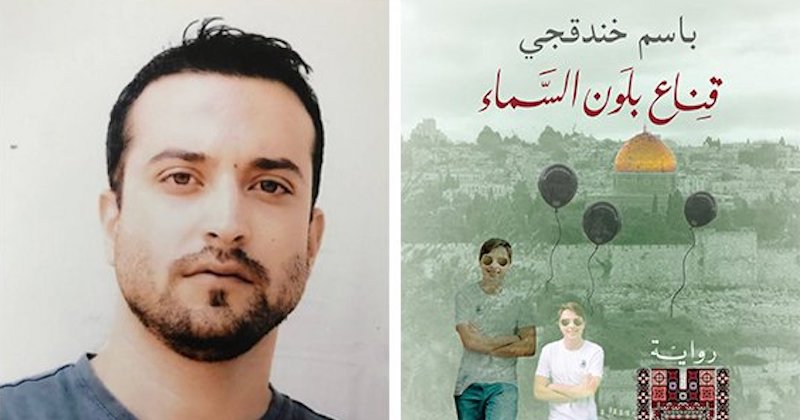An imprisoned Palestinian author has been shortlisted for the International Prize for Arabic Fiction.
A Mask, the Color of the Sky , the latest novel by imprisoned Palestinian author Basim Khandaqji, has been named among the six finalists for the 2024 International Prize for Arabic Fiction.
A Mask, the Color of the Sky revolves around the life of Nur, an archaeologist residing in a refugee camp in Ramallah. The story follows Nur’s discovery of a blue ID card belonging to an Israeli citizen tucked inside the pocket of an old coat. Intrigued, Nur assumes the persona of the card’s owner to gain access to excavation sites in the West Bank, and insight into his oppressor.
“This is the first time in the history of the Prize that a novel from (literally) behind the walls of an Israeli jail reaches out to readers on the other side,” Professor Yasir Suleiman, Chair of the Board of Trustees, said after unveiling the shortlist.
Khandaqji, born in Nablus in 1983, was arrested in 2004 at the age of 21 by Israeli authorities on terrorism charges and convicted of three life sentences for his participation in the planning of a suicide bombing that killed three people in Tel Aviv.
Khandaqji finished his education in prison and has since written at least six books, including four novels and two collections of poems.
As reported by ArabLit earlier this month, in an interview with the IPAF organizers, Khandaqji’s brother said that A Mask, the Color of the Sky was written between June and November 2021, “in difficult circumstances.” He added, “Basim was inside various prisons, moving from one prison to another because of the arbitrary measures taken by the prison service administration. Occasionally he would lose some of the information he had collected because a prison guard destroyed it.”
With regard to his writing rituals, his brother answered:
Writing rituals? No rituals apart from writing from 5 to 7am, that is what Basim told me on one of the monthly visits which last only 45 minutes. He writes before the prison administration counts the prisoners, and before the prison guard starts making a racket, which he is adept at finding new ways of doing. In these two hours, Basim writes approximately two pages, and very often the papers are taken from him and destroyed by the guard. Here of course I don’t mean that this happens only to Basim. It happens to all the prisoners who are writing while in detention.
Even if Khandaqji is selected as this year’s winner, he is unlikely to receive the $50,000 prize. The Israel Prison Service told Israeli media that “if it decided that a terrorist should be rewarded with a prize, it would be impossible to receive it.” Indeed, the author may not even be aware of his nomination, with Khandaqji’s family saying in January that they have not been able to contact him in recent months.
Palestinian author Osama Al-Eissa’s The Seventh Heaven of Jerusalem was also shortlisted for this year’s prize. The novel is set in Jerusalem during the 1970s, a time when the city’s inhabitants faced the challenges of war and famine.
Known as “the Arabic Booker,” the International Prize for Arabic Fiction was established in 2007 to recognize excellence in contemporary Arabic literature and promote a global readership of Arabic literary works, and is now widely regarded as the most prestigious literary prize in the Arab world.
Previous winners include Hoda Barakat (2019, for The Night Mail), Ahmed Saadawi (2014, for Frankenstein in Baghdad), and Mohammed Achaari (2011, for The Arch and the Butterfly).
Each of the six finalists will receive $10,000, and the winner, to be announced on the eve of the Abu Dhabi Book Fair in late April, will be awarded an additional $50,000. The prize also covers the cost of translating the winning books into English.





